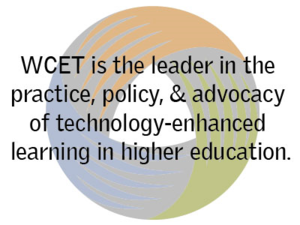
WCET’s 32nd Annual Meeting will bring together higher education leaders and practitioners who are working to improve educational quality and access through the use of technology. Join them for the premier edtech conference of the year.
Who will attend the Annual Meeting? The WCET audience represents leaders in higher education and technology who bring incredible insights and experiences, thus creating opportunities for meaningful dialogue. Who can submit a proposal? WCET members and non-members are invited to submit and attend. The program is a blend of formal presentations and informal discussions to foster idea exchange and networking. Interactive sessions featuring diverse perspectives are a hallmark of the WCET program. Sessions that are collaborative and interactive are preferred. The Call for Proposals for this year's Annual Meeting is open through April 10, 2020. Registration Registration for the Annual Meeting for speakers and WCET members will start at $750 and $875 for non-members. Students, with a current ID, are $300. All speakers must register for the Annual Meeting. Proposal Information Please review all submission information carefully. Proposals should:
Presenters are encouraged to minimize the use of PowerPoint in order to increase audience engagement and participation. Timeline
|
|
Proposals can be formal, tightly planned submissions or loosely organized 'unconference' topics. Unconference topics are attendee-driven discussions facilitated by a leader. Topic Areas (suggested but not limited to):
|
Session Formats
Please list your preference in the submission process. The review team will make the final determination of the ideal format for the session material submitted. Reviewers may re-work your proposal to combine it with another proposal on a related topic. WCET attendees find value in sessions which include multiple perspectives addressing a topic. Apart from pre-conference workshops, sessions are either 45 or 60-minutes. Note, several session formats exclude AV so craft your proposal with this in mind.
Formats are as follows:
- Pre-conference Workshop: The pre-conference workshops are in-depth, half-day workshops that focus on an emerging issue, trend, or topic in technology-enhanced learning in higher education. The workshops provide attendees with the knowledge and tools they need to return to their institutions prepared to offer solutions or implement a new program. Workshops are required to include interactivity. Up to three pre-conference workshops will be selected. Max three presenters. AV is optional.
- Panel:A panel consists of a moderator and two to three speakers (max) making a single, cohesive presentation on the same topic. Speakers represent different institutions/organizations, expertise, or points of view. Student perspectives are encouraged. AV is optional.
- Solo Presentation:Solo presentations are 45-minute sessions that spotlight edtech subject matter experts and innovators on a specific topic. Max one presenter and a moderator. AV is optional.
- Facilitated Group Discussion: One or two individuals act as the discussion leaders.They give a brief introduction(max 15 minutes) of the topic or issue and then facilitate an informal discussion among the audience members. The topic can be controversial and/or have a broad appeal that will elicit dialogue among the audience. Ideal for small groups. AV is not provided. Max two speakers.
- EdTech Meet-up Demos:One-on-one interaction using a table-top demonstration which provokes thoughtful discussion and fosters idea-sharing between attendees and presenters.The demos are tabletop displays and occur in conjunction with the morning and afternoon refreshment breaks and remain on display throughout one day of the conference. Edtech companies, colleges and universities, and other organizations are all invited to submit proposals for meet-up demos. The final number of meet-ups will be limited by the space available. Power and Internet are provided.
- Unconference Session: Unconference topics are attendee-driven discussions facilitated by a leader. Tackling a challenge at your institution? Curious what others are doing related to a technology-enhanced learning topic? Unconference sessions are similar to engaging hallway conversations attendees find so valuable and could include 20 images x 20 second formats like Ignite presentations, walk-and-talk sessions, or other. AV is not provided. Max three presenters.
- Failed Attempt Spotlight: Attendees learn as much, if not more, from failed attempts. Share your experiences and lessons learned. We tried it, we failed, and here is what we learned. AV is optional. Max three presenters.
- Other: Have a suggestion for a format not listed? Your suggestions are encouraged.
Sponsors and Corporate Members
Edtech companies and WCET Corporate Members and Sponsors are invited to submit proposals which include client perspectives as regular concurrent sessions listed above. They will be reviewed with the same consideration of other submissions, provided they are not specifically a demo or direct marketing of the product or service.
A limited number of sponsor session slots are provided to Leader level sponsors and higher and do not need to be submitted through the call for proposal system but must be submitted via email by June 1. The sponsor sessions are separate from the initial call for proposals. If you are interested in participating in a sponsor session, please email staff for more information and view the benefits and opportunities.
Submission Overview
To begin, all users need to create a new user profile.
- Speaker (s) profile information including contact details. Photos and bios are encouraged. Bios must be less than 100 words.
- Brief descriptive title (may be edited to fit the final program)
- Session description, no more than 1,200 characters.
- Preferred session hashtag beginning with #WCET20...., i.e. #WCET20CBE, #WCET20OER
- Preferred session format selected.
- Session topic area selected.
- Up to four key objectives of the session listed.
- Select target audience.
- Indicate whether AV is required or not and list.
- Proposal is submitted by April 10.
